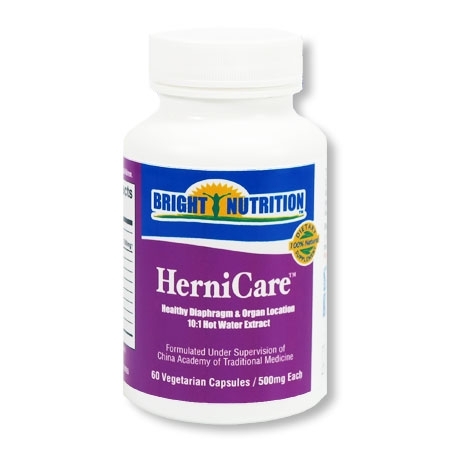
Wuhui Yushan, 60 capsules
Buy HerniCare
About Research on HerniCare Capsules
About Hernia Remedies
Return to the Home Page
________________________________________________________________________________________________________________________________________________________
HerniCare is an improved Hernia Remedy. HerniCare is made of extracts from lindera, costus root, fennel seed, blue citrus peel, areca nut, chinaberry, evodia, and citrus seed, this time-honored formula is used in Chinese medicine for its Qi (vital energy) building, stomach and intestine nurturing, distention relieving, abdominal discomfort soothing, diaphragm strengthening, internal organ dislocation correcting, and blood circulation promoting properties to maintain healthy relationship among body organs and their proper functions.
Lindera is supported by costus(Aucklandia) root, fennel seed, blue citrus peel, evodia and citrus seed which are all characterized as pungent, warm and aromatic. Costus root promotes Qi circulation, relieves distention, controls pain, normalizes and harmonizes the stomach. Fennel works on the liver, spleen, kidney and the stomach and is used in Chinese medicine for abdominal distention and pain, and hernia. Blue citrus peel soothes the liver, and regulate the Qi, disperse accumulation, etc and is used in Chinese medicine for chest and epigastric pain, hernia, etc. Evodia is pungent and bitter in flavor and hot in nature and works on the liver, stomach, spleen and kidney and is used to dispel cold, regulate the Qi, and control pain. It is mainly applied for cold pain in the abdominal area, especially inguinal hernia dropping to the scrotum, etc. Citrus seed regulates Qi, disintegrates accumulation, soothes pain and is commonly used for testicular edema and asthenic-chilling hernia. Areca nut and chinaberry are considered auxiliary herbs. While areca nut is used for swelling and distention in the abdomen by regulating the Qi and expel accumulation, Chinaberry is used to regulate Qi and control pain including abdominal and hernia pain. Generally speaking Chinaberry is considered very cold and therefore is commonly used for hot symptoms (hernia is classified as cold symptom), its “coldness” is counter balanced by the “very hot” evodia.